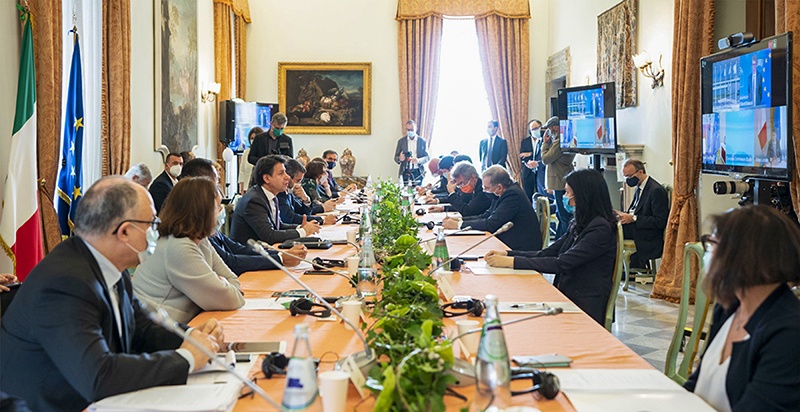
ROME: Prime Minister Giuseppe Conte called Saturday for a “courageous plan” in launching virtual talks with EU and IMF leaders to rescue Italy’s economy and society from the “unprecedented shock” triggered by the coronavirus pandemic.
Conte said the plan was needed to surmount the nation’s crisis as Italian opposition figures shunned the hastily organized and roundly criticized emergency talks—and as reports emerged of new virus cases in Rome. European Union leaders “must show that they have understood that it is about defending mutual interests,” Conte said in an opening speech transmitted to leading executives in Brussels.
“We are in the process of living an unprecedented shock with very high human, social and economic costs,” said Conte, whose country had recorded 34,301 coronavirus deaths to Saturday—one of the worst tolls in Europe.
The EU’s third largest economy is expected to contract by at least 8.3 percent in 2020, under the most optimistic official estimate. To stimulate activity in EU countries most affected by the COVID-19 crisis, the European Commission has proposed a 750-billion-euro ($847-billion) recovery plan — 500 billion euros in grants and 250 billion euros in loans.
Italy is expected to receive around 172 billion euros of this sum. “We must also take advantage of (the moment) to transform the crisis into an opportunity to eliminate all the obstacles that slowed (the country) down for the last 20 years,” Conte said.
He said he shared European Commission President Ursula von der Leyen’s view that “we cannot allow ourselves to return to the pre-crisis status quo”.
The talks venue is a 17th century palace, the Casino del Bel Respiro, which Conte called a rare choice “to pay tribute to Italian beauty”. Participating remotely were Von der Leyen, the EU’s economic affairs commissioner Paolo Gentiloni, European Council President Charles Michel, as well as International Monetary Fund director Kristalina Georgieva, a Bulgarian who previously served on the European Commission, the EU executive.
“This is the moment for you to develop and implement an effective recovery plan,” Von der Leyen said, adding the Commission will support Italy until recovery. Michel said that “by reinforcing Italy, we are also reinforcing Europe.”
“We must not forget,” he added. “Italy’s sacrifice probably indirectly saved lives in the rest of Europe”. Italy was hit with the virus before it reached most of its neighbors.
Although his approval ratings rose during the coronavirus emergency, Conte faces questions from prosecutors over his handling of the pandemic and now confronts political challenges over the threat of deep recession. Conte has suggested a task force headed by former Vodafone chief executive Vittorio Colao to come up with recommendations on how to get Italy’s economy back on track.
Conte said last week he wanted to unite “the country’s strongest forces” and compile the “most effective ideas” for an economic rebound following two months of lockdown. Proposals include digitizing Italy’s onerous public administration, modernizing infrastructure and restructuring the national university system, among others. But the opposition spurned Conte’s invitation and even government officials including Economy Minister Roberto Gualteri have criticized hasty plans and lack of cabinet input.
Reports of new cases in Rome—at a hospital and a building inhabited by squatters—only added to Italian concerns on Saturday with five fatalities and more than 100 people affected, health officials said.
Regional director of health Alessio d’Amato said 104 cases had been logged after an outbreak at the San Raffaele Pisana hospital in the west side of Rome, adding some 200 recent patients would have to be tested. Amato said the cluster was under control but that authorities were remaining highly vigilant. A further cluster of nine cases, who were hospitalized, was uncovered at a squatted block of flats in the southern district of Garbatella, regional health authorities said.
The building’s remaining residents—many of them immigrants—were quarantined while La Repubblica newspaper put cases at the block at 17. —AFP










